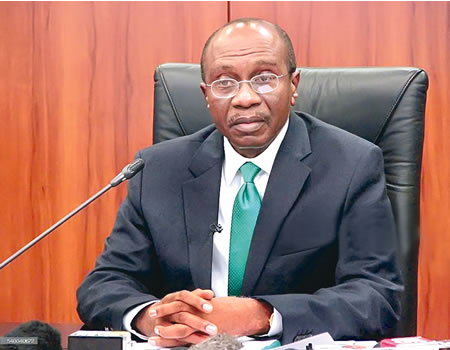As Central Bank of Nigeria (CBN) formally kick-started the process of revamping the country’s oil palm industry on Monday, its Governor, Godwin Emefiele lamented the loss of an estimated $10 billion annual foreign exchange earnings that would have accrued from the value chain.
At a stakeholders meeting on the palm oil value chain attended by Abia, Akwa Ibom and Edo states among other industry practitioners, Emefiele said in order to reverse the trend, the Bankers’ Committee has established a special sub-committee to make recommendations on sustainable financing models for oil palm and four other critical agricultural commodities that include cocoa, sesame seed, shea-butter, animal husbandry and cashew especially for smallholder farmers to improve their access to finance.
“This was in addition to a seminar sponsored by the Bank with the theme “Developing a Framework for the Sustainable Financing of Smallholders in the Oil Palm Value Chain in Nigeria” held in Asaba, Delta State on December 6, 2017.
“We expect to develop a funding model that will take into consideration the 3 – 4-year gestation period required in cultivating palm oil.
“As part of our Anchor Borrowers Program (ABP) and our Commercial Agriculture Credit Scheme (CACS), the CBN will work with large corporate stakeholders and small holder farmers to ensure availability of quality seeds for this year’s planting season and agro-chemicals in order to enable improved cultivation of palm oil.
“We will also work to encourage viable off taker agreements between farmers and large-scale palm producing companies.
“Loans will be granted through our ABP and CACS programs at no more than 9% p.a to identified core borrowers. Some of the targeted large scale farmers are in our midst today and we shall use the opportunity of this engagement to achieve concrete results.
“Indeed with an estimated three million hectares of land under cultivation, abundance of suitable arable land, we need the cooperation of our state Governments in the oil palm producing zone to make land available to investors with proven financial and technical capabilities, who will be able to support developments of large scale palm oil plantations in the country.
“I am happy to announce that all the states in the South-South and South- East regions have agreed to provide at least 100,000 hectares for the initiative.
“This program is also expected to accommodate the small holder farmers”, he explained
According to Emefiele, “in the late 50’s and 60’s, Nigeria was not only the world’s leading producer of palm oil, it was also the largest exporter of palm oil, with close to 40% of the global market share.
“Today we are a distant 5th among leading producers of palm oil; we barely produce up to 3% of the global supply of palm oil, with estimated production of 800,000 MT of palm oil, while countries like Malaysia and Indonesia produce 25million and 41 million tonnes of palm oil respectively.
“We have also become a net importer of palm oil, importing between 400,000 – 600,000 MT of palm oil in order to meet local demand for this commodity.
“Despite the availability of over 3m hectares of farmland for palm oil cultivation, production remains low at close to two tonnes per hectare, relative to a global benchmark of 25 tonnes per hectare.
“This is as a result of the maturation of existing palm trees, as some of these trees were planted in the 50’s, as well as low investment in replanting high yielding palm oil seeds. As some of you may know, the usual life cycle for optimum palm production is 25 years.”
He noted that despite placing oil palm in the forex exclusion list, official figures indicate that importation of palm oil had declined by about 40 per cent from the peak of 506,000 metric tons in 2014 to 302,000 MT in 2017.
“This indicates that Nigeria still expends close to $500 million on oil palm importation annually and we are determined to change this narrative.
“We intend to support improved production of palm oil to meet not only the domestic needs of the market, but to also increase our exports in order to improve our forex earnings.”
Recalling the restriction placed on importation of textile materials through officially sourced forex two weeks ago, Emefiele said “efforts are also being made to fast-track the financing of 100,000 cotton farmers for the 2019 farming season, in order to meet the needs of our ginneries.
“These measures have started bearing fruit with enquiries by various stakeholders and investors on how they can support improved production of textiles locally”, adding “these steps are necessary in order to address the loss of over $4 billion expended on textile importation annually.”
He promised that in due course, CBN intends to also address challenges in the cocoa, cassava, beef/cattle ranching, dairy and fish sectors.
“Soon every region of our beloved country will feel the positive impact of our intervention in the agricultural sector”, he declared.






